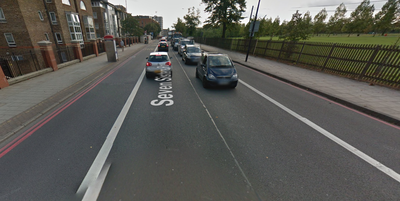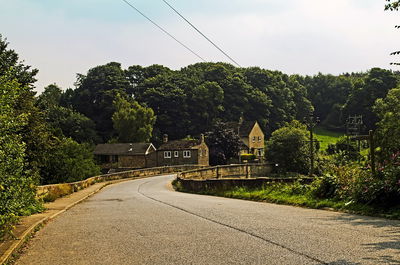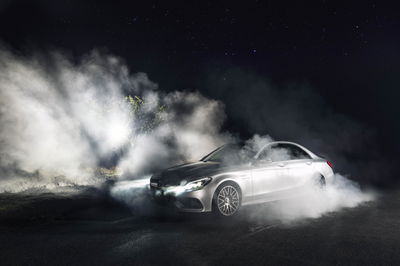Removing White Lines From Roads Is A Dumb Idea That's Actually Happening In Britain

Believe it or not, it turns out British highway chiefs have been removing white lines from busy roads in order to slow motorists down. According to research, removing the central white lines reduces driver speed and makes people drive more cautiously, and therefore councils across the country are considering implementing similar schemes.
I don’t even know where to begin with how stupid this idea is. First of all, it seems to work on the assumption that the only reason cars ever crash is because people are speeding. That might be the view of the anti-car brigade, but it’s simply not true. Yes, speeding can exacerbate damage in the event of a crash, or increase the risk of an accident occurring, but there’s a time and a place to go fast and simply targeting a blanket reduction in speed won’t fix anything without education.
By removing the central white line, research shows that drivers are more cautious because it introduces an element of uncertainty over their road positions. According to Transport for London, which experimented with removing the white lines on three major roads, speed was reduced by an average of 13 per cent. Great, but what about the risk of head-on collisions?

Coincidentally, I used to live in Haringey, so I know Seven Sisters Road - one of the trial roads - very well, and I can tell you that I can’t imagine how intimidating it must be not having any dividing markers. On larger sections of road, cars are kept separate, but on the two lane sections where the central lines were removed (see above) you have a lot of traffic, bus lanes either side, and people constantly walking back and forth across the road since it’s in a large residential area. That’s a lot of things to concentrate on without having to constantly worry about a head-on collision. Remember, the average driver isn’t like us, and isn’t necessarily the most confident or capable behind the wheel.
And anyway, introducing ‘uncertainty’ to a driver can’t be a solution to a problem. If you think about the number of things you have to concentrate on while driving and the number of things you have to be looking for in the distance, having a driver constantly scanning the centre of the road to check they’re not wandering too much is just adding an extra distraction.
It’s not often you’ll see me agree with something from the road safety charity Brake - it’s a noble cause but tends to be a little too black and white about what’s dangerous - but campaigns director Gary Rae sums up the problem pretty well. He said “While crashes at lower speeds can mean fewer deaths and serious injuries this data only seems to look at a possible reduction in average speed and not the number and nature of any collisions.”

Simply put, the research data only looks at marking removals’ effect on speed, and not its effect on crashes. I don’t see how this can do anything other than increase crash risk. White lines give us an easy-to-understand marker that helps us subconsciously place our car on the road while our conscious mind focuses on our surroundings.
One of my favourite quotes from this story comes from David Davies, the executive director of a parliamentary advisory group on road safety called PACTS, who said this process was most effective when lines were simply not repainted on newly resurfaced roads. He said: “A brand new surface can encourage drivers to go faster, but a lack of markings could counter that, reducing speed, say, from 35 to 28mph and that could make a significant difference.”
What exactly is this based on? Claiming people drive faster on newer roads is completely anecdotal, as he offers no research to back up the claim. He then plucks two random speeds from the air, and qualifies it all with a ‘could make a difference’. What he’s basically saying is ‘I have absolutely no idea if this will make a difference, but speeding is always bad so these measures are good.’ And this guy advises the government…

Aside from the fact that this surely makes roads inherently more dangerous, there is a technology argument against this, too. Many modern cars incorporate safety features that read the road and alert drivers to dangers, which would become ineffectual without reference points. Furthermore, as driverless cars become more prominent, removing the road markings that these vehicles rely on could cause serious problems.
It’ll be interesting to see how extensively this is taken up by local councils. For the moment, it appears to be happening in largely rural locations such as Norfolk, where speeds tend to be lower anyway. TfL has said there are no plans to actively remove lines in London, but seems pleased with how its previous tests went. I would be happy to hold my hands up and say I’m wrong if plenty of research shows that the risk of crashes decreases, but I feel like removing lines is a risky solution to fears over speeding. In my opinion you’re reducing one problem by creating another…
Sources: The Guardian and The Telegraph














Comments
Next take away the engine
They can’t go fast without an engine
Odd, I thought transportation was to get people and products from point A, to point B, as quickly and safely as possible. Not introduce ‘uncertainty’ into the equation. I just want to slap the stupid out of people who lose sight of what roads are for. They’re so busy trying to control traffic, they have forgotten all about traffic flow. In the 80’s, in Tacoma, Washington, you used to be able to maintain a certain speed and hit every green light. It was actually unusual to have to stop. Stopped cars waste time, fuel and produce more pollution. We already have enough sheep on the road, this would be a nightmare.
Driving on the wrong (left) side of the road also “introduces uncertainty” and this is also happening in Britain so I’m not even surprised actually.
Because it’s never overconfident driver’s that make no adjustment to the driving given the current road conditions and situation that cause accidents is it?
Nope, it’s the ones that intently stay aware of their surroundings that will now drive slower thanks to no white lines….. Well done Guys….. well done….
Same logic as…we can prevent cancer by killing people.
I know it’s a bad habit, but I tend to drive more in the middle of the road if there is no lines.
That is literally the dumbest thing I’ve ever heard of. I always thought of Britain as a pretty posh and well made country, I’m surprised something this stupid would come from there.
Because all of Great Britain should be a race track. Who wouldn’t want to see the 24 hour race of GB.
Wait, so they can’t fix the terrible roads we have with all the money they make off motorists (Fines, parking tickets, road tax, etc etc) but they can do this. Dafuq?
Because slower automatically means safer. Makes total sense…..
Pagination